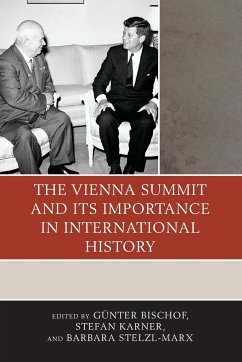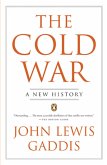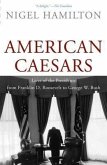The Vienna Summit and Its Importance in International History
Herausgeber: Bischof, Günter; Stelzl-Marx, Barbara; Karner, Stefan
The Vienna Summit and Its Importance in International History
Herausgeber: Bischof, Günter; Stelzl-Marx, Barbara; Karner, Stefan
- Broschiertes Buch
- Merkliste
- Auf die Merkliste
- Bewerten Bewerten
- Teilen
- Produkt teilen
- Produkterinnerung
- Produkterinnerung
At the beginning of June 1961, the tensions of the Cold War were supposed to abate as both sides sought a resolution. The two most important men in the world, John F. Kennedy and Nikita Khrushchev, met for a summit in Vienna. Yet the high hopes were disappointed. Within months...
Andere Kunden interessierten sich auch für
![Concise Untold History of the United States Concise Untold History of the United States]() Oliver StoneConcise Untold History of the United States20,99 €
Oliver StoneConcise Untold History of the United States20,99 €![The Cubans The Cubans]() Anthony DePalmaThe Cubans19,99 €
Anthony DePalmaThe Cubans19,99 €![The Cold War The Cold War]() John Lewis GaddisThe Cold War17,99 €
John Lewis GaddisThe Cold War17,99 €![American Caesars American Caesars]() Nigel HamiltonAmerican Caesars25,99 €
Nigel HamiltonAmerican Caesars25,99 €![The German War The German War]() Nicholas StargardtThe German War22,99 €
Nicholas StargardtThe German War22,99 €![The Congress of Vienna The Congress of Vienna]() Harold NicolsonThe Congress of Vienna19,99 €
Harold NicolsonThe Congress of Vienna19,99 €![A Diplomat's Memoir of 1870 being the account of a balloon escape from the siege of Paris and a political mission to London and Vienna A Diplomat's Memoir of 1870 being the account of a balloon escape from the siege of Paris and a political mission to London and Vienna]() Frederic ReitlingerA Diplomat's Memoir of 1870 being the account of a balloon escape from the siege of Paris and a political mission to London and Vienna19,99 €
Frederic ReitlingerA Diplomat's Memoir of 1870 being the account of a balloon escape from the siege of Paris and a political mission to London and Vienna19,99 €-
-
-
At the beginning of June 1961, the tensions of the Cold War were supposed to abate as both sides sought a resolution. The two most important men in the world, John F. Kennedy and Nikita Khrushchev, met for a summit in Vienna. Yet the high hopes were disappointed. Within months...
Hinweis: Dieser Artikel kann nur an eine deutsche Lieferadresse ausgeliefert werden.
Hinweis: Dieser Artikel kann nur an eine deutsche Lieferadresse ausgeliefert werden.
Produktdetails
- Produktdetails
- The Harvard Cold War Studies Book Series
- Verlag: Lexington Books
- Seitenzahl: 550
- Erscheinungstermin: 25. August 2016
- Englisch
- Abmessung: 229mm x 152mm x 29mm
- Gewicht: 787g
- ISBN-13: 9781498524865
- ISBN-10: 1498524869
- Artikelnr.: 42968981
- Herstellerkennzeichnung
- Books on Demand GmbH
- In de Tarpen 42
- 22848 Norderstedt
- info@bod.de
- 040 53433511
- The Harvard Cold War Studies Book Series
- Verlag: Lexington Books
- Seitenzahl: 550
- Erscheinungstermin: 25. August 2016
- Englisch
- Abmessung: 229mm x 152mm x 29mm
- Gewicht: 787g
- ISBN-13: 9781498524865
- ISBN-10: 1498524869
- Artikelnr.: 42968981
- Herstellerkennzeichnung
- Books on Demand GmbH
- In de Tarpen 42
- 22848 Norderstedt
- info@bod.de
- 040 53433511
Günter Bischof is a university research professor and director of CenterAustria at the University of New Orleans, Louisiana. Stefan Karner is head of the Department of Economic, Social, and Business History at the University of Graz and director of the Ludwig Boltzmann Institute for Research of War Consequences, Graz-Vienna. Barbara Stelzl-Marx is deputy director of the Ludwig Boltzmann Institute for Research of War Consequences and lecturer at the University of Graz.
Part I: Introduction and Historical Context Chapter 1: Introduction: The Vienna Summit and Its Importance in International History
Günter Bischof
Stefan Karner
Barbara Stelzl-Marx Chapter 2: Summitry in the Twentieth Century: An Overview
David Reynolds Part II: Contextualizing the Vienna Summit United States
France
and Great Britain Chapter 3: "The First Test of [. . .] Détente Will Be the Berlin Negotiation": Berlin
Disarmament
and the 1960 Paris Summit
Richard D. Williamson Chapter 4: "Vienna
a City that is Symbolic of the Possibility of Finding Equitable Solutions": John F. Kennedy and His European Summitry in Early June 1961
Günter Bischof and Martin Kofler Chapter 5: Great Britain and the Vienna Summit of June 1961
Anne Deighton Chapter 6: Paris as Beneficiary of the Unsuccessful Vienna Summit
Georges-Henri Soutou Soviet Union Chapter 7: Soviet-American Relations in the Early 1960s
Vladimir Pechatnov Chapter 8: Between Pragmatism and Ideology: The U.S. -Soviet Negotiating Process in the Khrushchev Era
Ol'ga Pavlenko Asia and Africa Chapter 9: Casting a Long Shadow over Vienna: The Chinese Factor in the Vienna Summit
Michail Prozumenshchikov Chapter 10: Laos and the Vienna Summit
Lawrence Freedman Part III: The Summit Chapter 11: Two Days of Drama: Preparation and Execution of the Vienna Summit
Barbara Stelzl-Marx Chapter 12: A Difficult Education: John F. Kennedy and Nikita S. Khrushchev in Vienna
Timothy Naftali Chapter 13: "Summit Ladies": Gender Arrangements
Media Staging
and Symbolic Scenes of the 1961Vienna Summit Talks
Ingrid Bauer Chapter 14: Moral Masculinity: Gender
Power
and the Kennedy-Khrushchev Relationship
Jennifer Lynn Walton Chapter 15: On the Significance of Austrian Neutrality for Soviet Foreign Policy under Nikita S. Khrushchev
Peter Ruggenthaler Chapter 16: The Personal Recollections of a Presidential Adviser in Vienna
Ted Sorensen Chapter 17: The Personal Recollections of Khrushchev's Interpreter in Vienna
Viktor Sukhodrev Part IV: The Berlin Crisis Chapter 18: Khrushchev
the Berlin Wall
and the Demand for a Peace Treaty
1961-1963
Gerhard Wettig Chapter 19: The Vienna Summit and the Construction of the Berlin Wall
Manfred Wilke Appendices Appendix 1: Soviet Kennedy Profile Appendix 2: CIA Profile of Krushchev in Kennedy's Briefing Papers Appendix 4:Krushchev's Presidium Statement before the Vienna Trip Appendix 3-1:Memorandum of Conversation
Vienna
3 June 1961
12:45 p.m. Appendix 3-2:Memorandum of Conversation
Vienna
3 June 1961
3 p.m. Appendix 3-3:Memorandum of Conversation
Vienna
4 June 1961
10:15 a.m.
Günter Bischof
Stefan Karner
Barbara Stelzl-Marx Chapter 2: Summitry in the Twentieth Century: An Overview
David Reynolds Part II: Contextualizing the Vienna Summit United States
France
and Great Britain Chapter 3: "The First Test of [. . .] Détente Will Be the Berlin Negotiation": Berlin
Disarmament
and the 1960 Paris Summit
Richard D. Williamson Chapter 4: "Vienna
a City that is Symbolic of the Possibility of Finding Equitable Solutions": John F. Kennedy and His European Summitry in Early June 1961
Günter Bischof and Martin Kofler Chapter 5: Great Britain and the Vienna Summit of June 1961
Anne Deighton Chapter 6: Paris as Beneficiary of the Unsuccessful Vienna Summit
Georges-Henri Soutou Soviet Union Chapter 7: Soviet-American Relations in the Early 1960s
Vladimir Pechatnov Chapter 8: Between Pragmatism and Ideology: The U.S. -Soviet Negotiating Process in the Khrushchev Era
Ol'ga Pavlenko Asia and Africa Chapter 9: Casting a Long Shadow over Vienna: The Chinese Factor in the Vienna Summit
Michail Prozumenshchikov Chapter 10: Laos and the Vienna Summit
Lawrence Freedman Part III: The Summit Chapter 11: Two Days of Drama: Preparation and Execution of the Vienna Summit
Barbara Stelzl-Marx Chapter 12: A Difficult Education: John F. Kennedy and Nikita S. Khrushchev in Vienna
Timothy Naftali Chapter 13: "Summit Ladies": Gender Arrangements
Media Staging
and Symbolic Scenes of the 1961Vienna Summit Talks
Ingrid Bauer Chapter 14: Moral Masculinity: Gender
Power
and the Kennedy-Khrushchev Relationship
Jennifer Lynn Walton Chapter 15: On the Significance of Austrian Neutrality for Soviet Foreign Policy under Nikita S. Khrushchev
Peter Ruggenthaler Chapter 16: The Personal Recollections of a Presidential Adviser in Vienna
Ted Sorensen Chapter 17: The Personal Recollections of Khrushchev's Interpreter in Vienna
Viktor Sukhodrev Part IV: The Berlin Crisis Chapter 18: Khrushchev
the Berlin Wall
and the Demand for a Peace Treaty
1961-1963
Gerhard Wettig Chapter 19: The Vienna Summit and the Construction of the Berlin Wall
Manfred Wilke Appendices Appendix 1: Soviet Kennedy Profile Appendix 2: CIA Profile of Krushchev in Kennedy's Briefing Papers Appendix 4:Krushchev's Presidium Statement before the Vienna Trip Appendix 3-1:Memorandum of Conversation
Vienna
3 June 1961
12:45 p.m. Appendix 3-2:Memorandum of Conversation
Vienna
3 June 1961
3 p.m. Appendix 3-3:Memorandum of Conversation
Vienna
4 June 1961
10:15 a.m.
Part I: Introduction and Historical Context Chapter 1: Introduction: The Vienna Summit and Its Importance in International History
Günter Bischof
Stefan Karner
Barbara Stelzl-Marx Chapter 2: Summitry in the Twentieth Century: An Overview
David Reynolds Part II: Contextualizing the Vienna Summit United States
France
and Great Britain Chapter 3: "The First Test of [. . .] Détente Will Be the Berlin Negotiation": Berlin
Disarmament
and the 1960 Paris Summit
Richard D. Williamson Chapter 4: "Vienna
a City that is Symbolic of the Possibility of Finding Equitable Solutions": John F. Kennedy and His European Summitry in Early June 1961
Günter Bischof and Martin Kofler Chapter 5: Great Britain and the Vienna Summit of June 1961
Anne Deighton Chapter 6: Paris as Beneficiary of the Unsuccessful Vienna Summit
Georges-Henri Soutou Soviet Union Chapter 7: Soviet-American Relations in the Early 1960s
Vladimir Pechatnov Chapter 8: Between Pragmatism and Ideology: The U.S. -Soviet Negotiating Process in the Khrushchev Era
Ol'ga Pavlenko Asia and Africa Chapter 9: Casting a Long Shadow over Vienna: The Chinese Factor in the Vienna Summit
Michail Prozumenshchikov Chapter 10: Laos and the Vienna Summit
Lawrence Freedman Part III: The Summit Chapter 11: Two Days of Drama: Preparation and Execution of the Vienna Summit
Barbara Stelzl-Marx Chapter 12: A Difficult Education: John F. Kennedy and Nikita S. Khrushchev in Vienna
Timothy Naftali Chapter 13: "Summit Ladies": Gender Arrangements
Media Staging
and Symbolic Scenes of the 1961Vienna Summit Talks
Ingrid Bauer Chapter 14: Moral Masculinity: Gender
Power
and the Kennedy-Khrushchev Relationship
Jennifer Lynn Walton Chapter 15: On the Significance of Austrian Neutrality for Soviet Foreign Policy under Nikita S. Khrushchev
Peter Ruggenthaler Chapter 16: The Personal Recollections of a Presidential Adviser in Vienna
Ted Sorensen Chapter 17: The Personal Recollections of Khrushchev's Interpreter in Vienna
Viktor Sukhodrev Part IV: The Berlin Crisis Chapter 18: Khrushchev
the Berlin Wall
and the Demand for a Peace Treaty
1961-1963
Gerhard Wettig Chapter 19: The Vienna Summit and the Construction of the Berlin Wall
Manfred Wilke Appendices Appendix 1: Soviet Kennedy Profile Appendix 2: CIA Profile of Krushchev in Kennedy's Briefing Papers Appendix 4:Krushchev's Presidium Statement before the Vienna Trip Appendix 3-1:Memorandum of Conversation
Vienna
3 June 1961
12:45 p.m. Appendix 3-2:Memorandum of Conversation
Vienna
3 June 1961
3 p.m. Appendix 3-3:Memorandum of Conversation
Vienna
4 June 1961
10:15 a.m.
Günter Bischof
Stefan Karner
Barbara Stelzl-Marx Chapter 2: Summitry in the Twentieth Century: An Overview
David Reynolds Part II: Contextualizing the Vienna Summit United States
France
and Great Britain Chapter 3: "The First Test of [. . .] Détente Will Be the Berlin Negotiation": Berlin
Disarmament
and the 1960 Paris Summit
Richard D. Williamson Chapter 4: "Vienna
a City that is Symbolic of the Possibility of Finding Equitable Solutions": John F. Kennedy and His European Summitry in Early June 1961
Günter Bischof and Martin Kofler Chapter 5: Great Britain and the Vienna Summit of June 1961
Anne Deighton Chapter 6: Paris as Beneficiary of the Unsuccessful Vienna Summit
Georges-Henri Soutou Soviet Union Chapter 7: Soviet-American Relations in the Early 1960s
Vladimir Pechatnov Chapter 8: Between Pragmatism and Ideology: The U.S. -Soviet Negotiating Process in the Khrushchev Era
Ol'ga Pavlenko Asia and Africa Chapter 9: Casting a Long Shadow over Vienna: The Chinese Factor in the Vienna Summit
Michail Prozumenshchikov Chapter 10: Laos and the Vienna Summit
Lawrence Freedman Part III: The Summit Chapter 11: Two Days of Drama: Preparation and Execution of the Vienna Summit
Barbara Stelzl-Marx Chapter 12: A Difficult Education: John F. Kennedy and Nikita S. Khrushchev in Vienna
Timothy Naftali Chapter 13: "Summit Ladies": Gender Arrangements
Media Staging
and Symbolic Scenes of the 1961Vienna Summit Talks
Ingrid Bauer Chapter 14: Moral Masculinity: Gender
Power
and the Kennedy-Khrushchev Relationship
Jennifer Lynn Walton Chapter 15: On the Significance of Austrian Neutrality for Soviet Foreign Policy under Nikita S. Khrushchev
Peter Ruggenthaler Chapter 16: The Personal Recollections of a Presidential Adviser in Vienna
Ted Sorensen Chapter 17: The Personal Recollections of Khrushchev's Interpreter in Vienna
Viktor Sukhodrev Part IV: The Berlin Crisis Chapter 18: Khrushchev
the Berlin Wall
and the Demand for a Peace Treaty
1961-1963
Gerhard Wettig Chapter 19: The Vienna Summit and the Construction of the Berlin Wall
Manfred Wilke Appendices Appendix 1: Soviet Kennedy Profile Appendix 2: CIA Profile of Krushchev in Kennedy's Briefing Papers Appendix 4:Krushchev's Presidium Statement before the Vienna Trip Appendix 3-1:Memorandum of Conversation
Vienna
3 June 1961
12:45 p.m. Appendix 3-2:Memorandum of Conversation
Vienna
3 June 1961
3 p.m. Appendix 3-3:Memorandum of Conversation
Vienna
4 June 1961
10:15 a.m.








